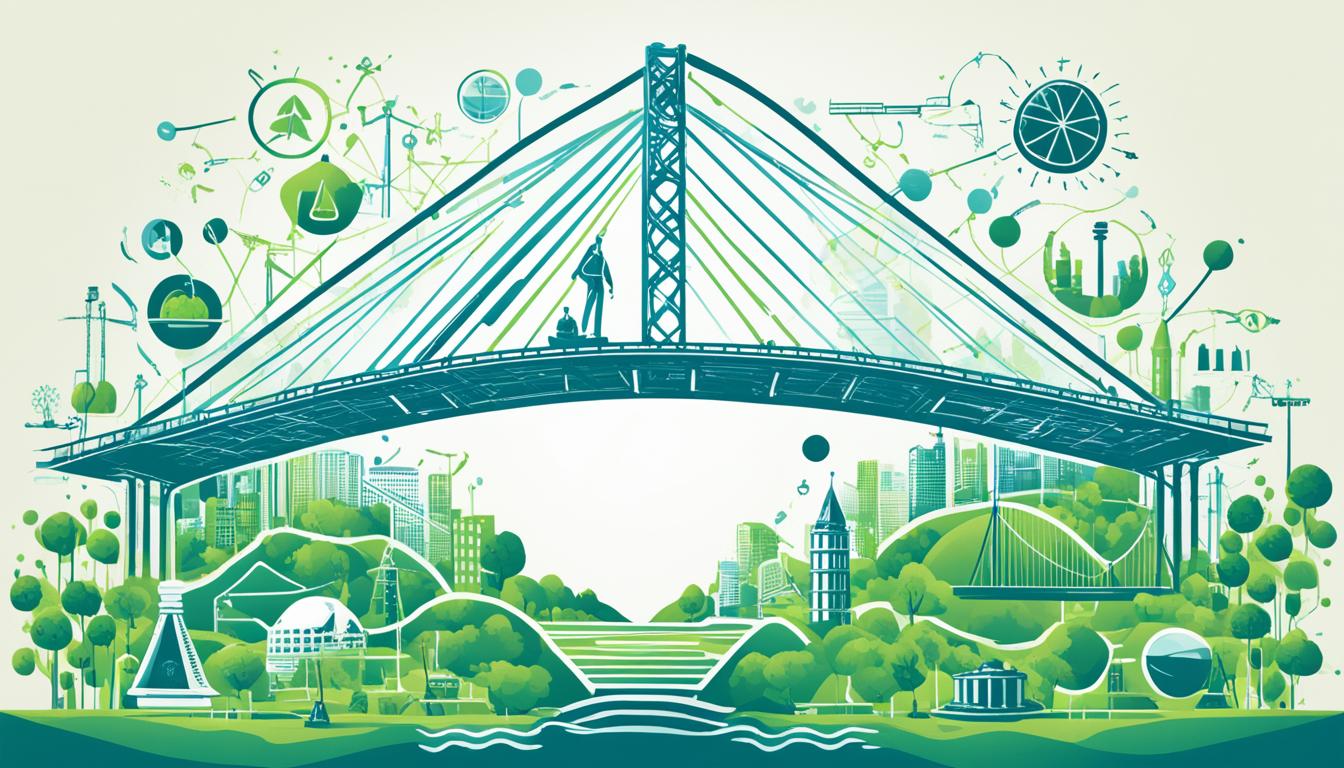At the intersection of science and law, legal experts play a vital role in environmental research. As our understanding of the natural world deepens and environmental issues become increasingly complex, legal experts act as the bridge between scientific knowledge and the development of effective policies and regulations.
Through their expertise in law, these professionals navigate the intricate legal frameworks surrounding environmental issues, ensuring compliance with regulations and advocating for sustainable practices. They help translate scientific findings into actionable policies that promote a greener future.
By collaborating with scientists, policymakers, and stakeholders, legal experts contribute to the development of legislation that addresses environmental challenges. Their interdisciplinary efforts enhance the integration of scientific knowledge into legal frameworks, leading to informed decision-making and positive environmental outcomes.
Key Takeaways:
- Legal experts play a vital role in bridging the gap between science and law in environmental research.
- They navigate complex legal frameworks, ensuring compliance and advocating for sustainable practices.
- Collaboration with scientists, policymakers, and stakeholders enhances the development of effective environmental legislation.
- Interdisciplinary efforts lead to informed decision-making and positive environmental outcomes.
- Their role is crucial in promoting a greener and more sustainable future.
Understanding Translational Ecology in Environmental Legislation
Translational ecology is an emerging approach that seeks to improve the relevance and application of ecological science in environmental legislation. It encompasses the evolution of the field, with a focus on the integration of ecological knowledge into legal frameworks. This integration has led to a better understanding of the impact of ecological science on environmental law, as well as the need for collaborative efforts between scientists, legal experts, policymakers, and stakeholders to develop sustainable legislation. Through translational ecology, the gap between scientific research and environmental policy is bridged, leading to more informed decision-making, effective regulations, and sustainable practices.
The Evolution of Translational Ecology
The concept of translational ecology has evolved over time, driven by the recognition of the importance of integrating scientific research into environmental decision-making processes. Initially rooted in the field of medicine, where translational research aimed to bridge the gap between bench research and clinical applications, translational ecology has adapted this approach to address the complexities of environmental issues. It recognizes that scientific knowledge alone is insufficient to drive meaningful change and that collaboration between scientists, legal experts, and policymakers is essential to translate research findings into sustainable legislation.
Impact of Ecological Science on Environmental Law
Ecological science provides valuable insights into the functioning of ecosystems and the impacts of human activities on the environment. These insights are instrumental in shaping environmental legislation by informing policymakers and legal experts about the ecological consequences of certain practices and guiding the development of regulations that aim to mitigate environmental harm. By incorporating ecological science into the legal framework, environmental law becomes more robust and effective, ensuring the protection and preservation of ecosystems for future generations.
Collaborative Efforts Toward Sustainable Legislation
Creating sustainable legislation requires collaboration among various stakeholders, including scientists, legal experts, policymakers, and communities. By bringing together these diverse perspectives, collaborative efforts can draw on the expertise and insights of each group, resulting in legislation that is comprehensive, scientifically sound, and socially feasible. Through interdisciplinary collaboration, sustainable legislation can be developed that addresses environmental challenges while balancing economic considerations and societal needs.
Legal Solutions for Environmental Issues
Addressing environmental issues requires legal solutions that can effectively navigate complex environmental regulations and provide guidance in developing sustainable practices. Environmental law firms and sustainable business practices consultancies play a crucial role in offering expert advice and support to individuals, organizations, and governments. These legal entities offer a wide range of services, including:
- Legal advice on environmental regulations
- Policy development for sustainable practices
- Compliance strategies to ensure adherence to environmental laws
- Advocacy for environmental protection
Environmental law firms specialize in representing clients in environmental litigation, seeking compensation for damages caused by pollution, and holding responsible parties accountable for their actions. They use their legal expertise to advocate for the protection of natural resources and ensure compliance with environmental regulations.
Sustainable business practices consultancies provide guidance on sustainable development, advising on environmentally friendly practices and helping organizations align with environmental regulations. These consultancies work closely with businesses, offering compliance strategies and ensuring that sustainable practices are implemented.
By providing legal solutions, these experts enable individuals, organizations, and governments to mitigate environmental risks, address environmental challenges, and promote sustainability.
Legal solutions for environmental issues are critical in navigating complex regulations and addressing environmental challenges. Environmental law firms and sustainable business practices consultancies offer expert guidance and support to individuals, organizations, and governments. These legal entities provide a wide range of services, including legal advice, policy development, compliance strategies, and advocacy. With their expertise, legal experts ensure compliance with environmental regulations, promote sustainable practices, and play a crucial role in mitigating environmental risks. Through their efforts, a greener and more sustainable future becomes attainable.
Case Studies: Environmental Law Firms in Action
Environmental law firms are at the forefront of addressing environmental challenges through their legal expertise and interventions. These firms work diligently to protect the environment, seek justice for damages caused by pollution, and ensure compliance with relevant regulations.
Addressing Oil Pollution Through Legal Expertise
One area where environmental law firms make a significant impact is in addressing the issue of oil pollution. With their in-depth knowledge of environmental law, these firms advocate for the protection of natural resources and the rights of affected communities.
When oil spills occur, environmental law firms play a crucial role in holding responsible parties accountable. They pursue legal actions to seek compensation for damages, restore affected ecosystems, and push for the implementation of stricter regulations to prevent future incidents.
Water Conflicts and Legal Interventions
Water conflicts are another area where environmental law firms provide essential legal interventions. These conflicts may arise due to disputes over water allocation, pollution, or access to clean water sources.
Environmental law firms navigate the complex legal landscape surrounding water issues. They represent communities, stakeholders, and organizations affected by water conflicts, advocating for their rights and ensuring that water resources are managed sustainably.
Through legal interventions, these firms aim to resolve water disputes, establish equitable water allocation systems, and promote responsible water usage to safeguard both the environment and human well-being.
Table 1: Environmental Law Firm Case Studies
| Environmental Law Firm | Case Study | Outcome |
|---|---|---|
| Smith & Associates | Marine Oil Platform Pollution | Secured compensation for impacted coastal communities and influenced stricter environmental regulations for offshore oil platforms. |
| Green Legal Solutions | River Contamination Lawsuit | Successfully represented a local community in a lawsuit against a chemical plant, resulting in a significant cleanup effort and improved environmental monitoring. |
| Environmental Justice Law Group | Water Rights Conflict | Advocated for the rights of indigenous communities in a water rights dispute, leading to improved access to clean water and sustainable water management practices. |
Environmental Compliance Services: Navigating Complex Regulations
Environmental compliance services are essential for individuals and organizations to navigate the intricate web of complex environmental regulations. These services offer expert advice and support, ensuring compliance with environmental laws, regulations, and permits. By integrating scientific knowledge with compliance strategies, these services help address environmental challenges effectively, fostering sustainable practices and environmental stewardship.
Integrating Science with Compliance Strategies
In today’s world, environmental regulations are becoming increasingly intricate, requiring a deep understanding of scientific principles and their application in compliance strategies. Environmental compliance services bridge the gap between scientific research and legal frameworks by integrating science with compliance strategies. By leveraging a multidisciplinary approach and applying scientific knowledge to regulatory requirements, these services help individuals and organizations craft effective strategies that ensure environmental compliance while promoting sustainability.
Case Study: Anna Berti Suman’s Civic Monitoring Project
“Civic Monitoring allows communities to actively participate in the environmental decision-making process. By engaging citizens in data collection and analysis, we create empowered communities that contribute to environmental stewardship.”
– Anna Berti Suman, Environmental Compliance Expert
One inspiring example of integrating science and compliance strategies is Anna Berti Suman’s Civic Monitoring Project. This innovative initiative engages communities in monitoring and addressing environmental issues. Through civic monitoring, citizens actively participate in data collection, analysis, and decision-making processes. By empowering communities, this project demonstrates the power of science integration and compliance strategies in achieving sustainable practices and environmental progress.
With the use of civic monitoring, communities can monitor environmental indicators, identify potential violations, and advocate for necessary actions. This participatory approach creates a dialogue between citizens, regulatory bodies, and policymakers, driving effective environmental governance and fostering a sense of ownership and responsibility.
| Benefits of Civic Monitoring | Impact |
|---|---|
| Enhances accountability and transparency | Increases public trust in regulatory processes |
| Empowers communities to take meaningful action | Strengthens environmental governance |
| Promotes evidence-based decision-making | Leads to informed policy development |
| Provides a platform for citizen engagement | Fosters environmental stewardship |
Sustainable Development Legal Advice and Policy Shaping
Sustainable development legal advice plays a crucial role in shaping policies and advancing sustainable practices. Our team of legal experts provides expert advice and assistance in developing policies that promote environmental sustainability, social equity, and economic prosperity.
The Role of Legal Advice in Advancing Sustainable Practices
With our extensive knowledge of environmental law and regulations, we guide individuals, businesses, and governments in adopting sustainable practices. By integrating legal expertise with sustainability principles, we help our clients navigate the complexities of environmental regulations.
“Our legal advice enables businesses to implement sustainable practices that reduce their environmental impact and contribute to the global shift towards a greener economy.”
We work closely with our clients to develop strategies that drive positive environmental change while ensuring compliance with relevant laws and regulations. By providing legal guidance, we help businesses align their operations with sustainable development goals and foster a culture of environmental stewardship.
Building Policies for Future Sustainability
In addition to providing legal advice, we actively contribute to policy shaping to promote future sustainability. Our team collaborates with policymakers, stakeholders, and environmental organizations to develop laws and regulations that address current challenges while laying the groundwork for a sustainable future.
Through research, analysis, and advocacy, we influence policy development to prioritize environmental protection, conservation, and sustainable resource management. By incorporating scientific insights and collaboration, we ensure that policies align with the latest advancements in sustainable development. Our goal is to build a legal framework that supports sustainable practices and fosters a harmonious relationship between human activities and the natural environment.
With our dedication to sustainable development and environmental justice, we strive to shape policies that create a positive impact on both present and future generations.
Our sustainable development legal advice provides a foundation for policy shaping and drives positive change towards a greener and more equitable future. By combining legal expertise with sustainability principles, we empower individuals, businesses, and governments to prioritize environmental sustainability, foster social equity, and achieve long-term economic prosperity.
The Interplay Between Environmental Litigation Services and Research
Environmental litigation services play a crucial role in utilizing research and providing legal representation to empower communities. By integrating scientific research into environmental litigation, legal experts build strong cases that advocate for environmental justice and protect the rights of communities affected by environmental harms. Through their expertise, these experts empower communities by providing legal representation, advocating for their interests, and seeking justice for environmental damages. The interplay between environmental litigation services and research ensures that scientific evidence is effectively utilized in legal proceedings, leading to more informed decisions and positive outcomes for affected communities.

Utilizing Research in Environmental Litigation
The integration of research in environmental litigation enhances the strength and effectiveness of legal cases. Environmental litigation services leverage scientific studies, data, and expert opinions to build compelling arguments and support claims. Through careful analysis, legal experts utilize research findings to establish causation, assess the extent of environmental harm, and identify responsible parties. By bringing scientific evidence into the courtroom, environmental litigation services ensure that legal decisions are based on accurate and reliable information, ultimately contributing to the protection of the environment and affected communities.
Empowering Communities via Legal Representation
Environmental litigation services play a crucial role in empowering communities affected by environmental harms. By providing legal representation, these services give a voice to communities that may otherwise struggle to navigate complex legal processes. Legal experts advocate for the rights and interests of these communities, ensuring their concerns are heard and their experiences validated. Through litigation, environmental justice is pursued, and communities are empowered to hold responsible parties accountable for environmental damages. By providing access to legal representation, environmental litigation services empower communities to actively participate in the legal system and seek justice for the harm they have suffered.
From Theory to Practice: Real-World Impact of Environmental Legal Expertise
Environmental legal expertise plays a crucial role in addressing environmental challenges and making a tangible impact in the real world. Through empirical analysis and involvement in groundbreaking research projects, legal experts contribute to informed decision-making, effective policy development, and the promotion of sustainable practices.
Empirical Analysis of Legal Interventions on Ecology
Empirical analysis is an essential tool used by environmental legal experts to assess the effectiveness of legal interventions on ecology. By studying the outcomes of legal actions and their impact on the environment, experts gain valuable insights that inform future strategies and decision-making. This empirical analysis helps identify successful approaches, highlight areas for improvement, and guide the development of evidence-based environmental law and policy.
Involvement of Legal Experts in Groundbreaking Research Projects
Legal experts are actively involved in groundbreaking research projects that contribute to our understanding of environmental issues. Through collaborations with scientists, policymakers, and other stakeholders, they advance the knowledge base surrounding ecological challenges. By integrating legal expertise with scientific research, these projects address critical environmental concerns and drive positive change.
Through their participation in these research initiatives, legal experts bring a unique perspective that combines their legal knowledge with cutting-edge scientific advancements. This collaboration helps bridge the gap between theory and practice, ensuring that environmental research is effectively translated into actionable legal frameworks.
In conclusion, environmental legal expertise has a significant real-world impact through empirical analysis and involvement in groundbreaking research projects. By evaluating the effectiveness of legal interventions on ecology and contributing to innovative research, legal experts play a vital role in driving positive change and promoting sustainable practices.
Environmental Regulations Counsel: Advising on Compliance and Enforcement
Environmental regulations counsel plays a crucial role in providing expert advice on compliance and enforcement of environmental regulations. These legal experts assist individuals, businesses, and organizations in interpreting complex policy and regulatory frameworks to ensure compliance with environmental laws. By offering their expertise, they help navigate the intricacies of environmental regulations and develop effective compliance strategies.
Environmental Legal Advice in Policy and Regulation Interpretation
One of the key functions of environmental regulations counsel is to provide legal advice in the interpretation of policies and regulations. With their deep understanding of environmental law, these experts assist clients in comprehending the intricate nuances and complexities within the regulatory landscape. By offering expert counsel, they help clients stay updated with the latest policy developments and understand their rights and responsibilities.
In the realm of policy and regulation interpretation, environmental regulations counsel helps clients understand the obligations imposed by environmental laws, such as obtaining necessary permits, implementing pollution prevention measures, and complying with reporting requirements. They provide guidance on how to frame policies and practices that align with environmental regulations and promote sustainability.
Ensuring Environmental Regulations Compliance through Expert Counsel
Compliance with environmental regulations is a critical aspect of environmental stewardship and sustainability. Environmental regulations counsel plays a vital role in ensuring clients’ compliance with environmental laws and regulations. By conducting thorough environmental legal audits and assessments, these experts can identify areas of potential non-compliance and provide guidance on rectifying any existing issues.
Through their expert counsel, environmental regulations counsel helps clients understand and comply with complex environmental regulations, reducing the risk of legal disputes and penalties for non-compliance. They aid in the development and implementation of compliance programs that align with regulatory requirements and advocate for environmentally responsible practices.

Expert counsel on environmental regulations helps organizations and individuals protect the environment, maintain regulatory compliance, and promote the sustainable use of natural resources. With their knowledge and experience, environmental regulations counsel contributes to preserving ecological balance and creating a greener future.
| Benefits of Environmental Regulations Counsel | Examples |
|---|---|
| Expert guidance on complex policy interpretation | Assistance in understanding and complying with environmental regulations |
| Development of compliance strategies | Identification and resolution of non-compliance issues |
| Risk mitigation and prevention of legal disputes | Advocacy for environmentally responsible practices |
| Promotion of sustainability and environmental stewardship | Preservation of natural resources and ecological balance |
Conclusion
Future Directions for Environmental Legal Experts in Research
In conclusion, environmental legal experts play a critical role in bridging the gap between science and the law to address environmental challenges. Their expertise in translating scientific knowledge into actionable policies and regulations is vital in promoting a greener future. As research continues to advance and new environmental issues emerge, there are exciting opportunities for environmental legal experts to further contribute to research and progress.
Looking ahead, the future direction for environmental legal experts lies in the continuous fusion of science and law. Interdisciplinary collaboration between legal experts, scientists, policymakers, and stakeholders will be crucial in developing effective policies and regulations. By integrating scientific knowledge into legal frameworks, informed decision-making can be achieved, leading to positive environmental outcomes.
The Continuous Fusion of Science and Law for Environmental Progress
The continuous fusion of science and law is the key to driving environmental progress. By leveraging the expertise of environmental legal experts and integrating their knowledge with scientific research, the development of effective policies and regulations becomes possible. This collaboration ensures that environmental challenges are addressed in a holistic and sustainable manner, promoting the preservation of our planet for future generations.
As we move forward, it is imperative that environmental legal experts continue to collaborate with scientists, policymakers, and stakeholders to create a greener and more sustainable future. Their contributions in bridging the gap between science and the law are essential in addressing the complex and pressing environmental issues we face today. Together, we can work towards a world where science and the law work hand in hand for the betterment of our environment.
FAQ
What is the role of legal experts in environmental research?
What is translational ecology and how does it relate to environmental legislation?
What services do environmental law firms and sustainable business practices consultancies provide?
How do environmental law firms contribute to addressing environmental challenges?
What are environmental compliance services and how do they help in navigating regulations?
Can you provide an example of how civic monitoring can address environmental issues?
How does sustainable development legal advice shape policies and practices?
How do environmental litigation services empower communities affected by environmental harms?
How does environmental legal expertise have a real-world impact on addressing environmental challenges?
What is the role of environmental regulations counsel in compliance and enforcement?
Source Links
- https://marie-sklodowska-curie-actions.ec.europa.eu/node/1125
- https://dc.law.utah.edu/cgi/viewcontent.cgi?article=1166&context=scholarship



